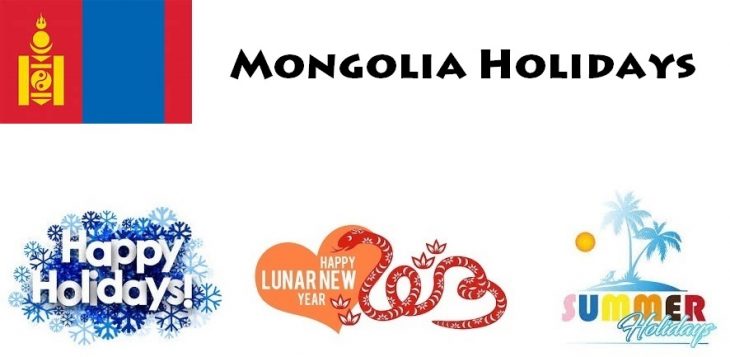Mongolia Holidays
Mongolia Public Holidays
Searching for the national holidays in Mongolia? All public holidays in Mongolia are treated like Sundays. This means that most of the Mongolia employees have a day off and all schools are closed on these office holidays. If you are planning a trip to Mongolia and want to know what the national and regional holidays are, check the details in the tables below.
List of Official Holidays in Mongolia for Year 2020
| # | Date | Holiday | Day |
| 1 | January 01, 2020 | New Year’s Day | Wednesday |
| 2 | January 25, 2020 | Tsagaan Sar | Saturday |
| 3 | January 26, 2020 | Tsagaan Sar Holiday | Sunday |
| 4 | January 27, 2020 | Tsagaan Sar Holiday | Monday |
| 5 | March 08, 2020 | International Women’s Day | Sunday |
| 6 | June 01, 2020 | Mother’s and Children’s Day | Monday |
| 7 | July 11, 2020 | Naadam | Saturday |
| 8 | July 12, 2020 | Naadam Holiday | Sunday |
| 9 | July 13, 2020 | Naadam Holiday | Monday |
| 10 | July 14, 2020 | Naadam Holiday | Tuesday |
| 11 | July 15, 2020 | Naadam Holiday | Wednesday |
| 12 | November 16, 2020 | Genghis Khan’s birthday | Monday |
| 13 | November 26, 2020 | Republic Day | Thursday |
| 14 | December 29, 2020 | Independence Day | Tuesday |
List of Official Holidays in Mongolia for Year 2021
| # | Date | Holiday | Day |
| 1 | January 01, 2021 | New Year’s Day | Friday |
| 2 | February 12, 2021 | Tsagaan Sar | Friday |
| 3 | February 13, 2021 | Tsagaan Sar Holiday | Saturday |
| 4 | February 14, 2021 | Tsagaan Sar Holiday | Sunday |
| 5 | March 08, 2021 | International Women’s Day | Monday |
| 6 | June 01, 2021 | Mother’s and Children’s Day | Tuesday |
| 7 | July 11, 2021 | Naadam | Sunday |
| 8 | July 12, 2021 | Naadam Holiday | Monday |
| 9 | July 13, 2021 | Naadam Holiday | Tuesday |
| 10 | July 14, 2021 | Naadam Holiday | Wednesday |
| 11 | July 15, 2021 | Naadam Holiday | Thursday |
| 12 | November 05, 2021 | Genghis Khan’s birthday | Friday |
| 13 | November 26, 2021 | Republic Day | Friday |
| 14 | December 29, 2021 | Independence Day | Wednesday |















































